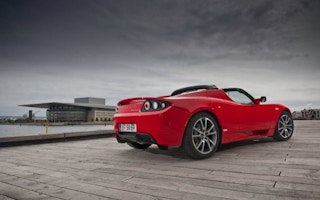Just as fuel cell vehicles were over-hyped 10 years ago, electric vehicles are in a similar scenario today - but that does not mean they cannot live up to their full potential, industry experts said at a green transport seminar on Wednesday.
Panellists at day two of the Clean Energy Expo Asia cautioned electric vehicle (EV) advocates about the need to manage expectations for the future of EVs.
“If you’re expecting an electric car to be just like your combustion car, you’re setting yourself up for failure,” said David Chou, managing director of Singapore-based electric vehicle research and development centre EV World.
He added that while combustion vehicles have had a long time to develop, the electric vehicle industry is still in its infancy and will take some time to mature. Consumers cannot expect EVs to be “ready” from day one, he said, referring to the fact that many improvements were still needed such as better performance in extreme weather conditions, longer lasting batteries and lower prices. He argued that the industry should move forward with marketing EV’s despite their flaws. “You have to start somewhere,” he said.
The primary challenge that emerged from the discussion was the development of EV batteries, and panellists agreed on the urgent need for research and development.
Mr Chou noted that technology is getting better and safer and prices of batteries are dropping drastically.
But Toyota Motor’s Bill Reinert, who manages the United States advanced technology group, said lithium-ion batteries – the industry’s current standard technology – are a long way from achieving the life-span and range that users need.
He noted that Tesla, a US company which makes electric sports vehicles, uses a US$40,000 battery that is considered expendable, just like the tyres. “We’ve got to get past that. We’ve got to (keep working) until there’s no downside to an electric car,” he said.
Until then, said the panellists, EV customers may have to compromise.
Mr Chou said that most consumers still think they have to buy a car that can travel the longest journey they will make, rather than choosing a vehicle that will suit most of their needs. As an example, he recalled a conversation with customers who wanted a car with enough range to travel from Singapore to Kuala Lumpur, a trip they made only twice each year. “We’ve got to change that mentality,” said Mr Chou.
Panellist Vivek Vaidya, a vice president in the automotive division at consultancy Frost & Sullivan, agreed that travellers should stop looking for a single solution to their transport needs.
EVs are going to fill niche needs, he said, such as commercial fleets and some urban commuters. Moreover, they will be only a part of an overall solution that allows travellers to pick and choose the mode of transport that fits the occasion.
Mr Vaidya recently completed a study on urban transport that included surveys of 27,600 travellers in 23 cities.
Having found that most cars are parked an average of 21.5 hours each day and more often than not, carried only a single passenger, Mr Vaidya concluded that travel habits needed to change to keep up with growing urban populations. Given the inefficiencies of car travel and the increasing congestion in cities today, no amount of urban infrastructure is going to be enough, he said.
At the same time, Mr Vaidya noted that public transport was more efficient but did not always suit travellers’ needs. The solution he suggested took the middle ground, and included a range of options such as car and bike sharing, and more car-pooling.
There are encouraging signs that point towards such trends. Singapore car-sharing company, Car Club, told Eco-Business that car-sharing was gaining in popularity here. They have seen a steady increase in membership, with growth of over 25 per cent this year alone. Currently, they have nearly 3,000 members and hope to exceed 4,000 next year.
Most of the firm’s customers do not need to drive on a daily basis, and use the car services for social purposes and for the occasional work-related trips.
Car Club’s spokesman said, “Given the government’s policy on private transport, the high cost of car ownership and the physical limits on car population growth, we are optimistic that car-sharing is an ideal solution to meet the challenges of urban mobility.”
He added that car-sharing complements public transport rather than competing against it because members continue to use public transport, as opposed to car owners who are indirectly compelled to drive because of the sunk cost of ownership.
One car can serve up to 27 drivers, he added, making the system more efficient and environmentally sustainable.
Both Toyota’s Mr Reinert and EV World’s Mr Chou said EVs had a role to play in car-sharing. Mr Reinert said that a major car sharing scheme in the US was exploring the use of electric cars in its fleet, and Mr Chou said that a car rental company in Hawaii - Enterprise - was considering using Nissan Leafs in its fleet.
Mr Reinert said, however, that if the goal of electrical vehicles is to reduce carbon emissions from transportation, then cities would have to clean up their electricity grids.
Mr Vaidya agreed: “Unless we have clean power and smarter grids, we will not get the full advantage of electric vehicles.”
Eco-Business.com’s coverage of Clean Energy Expo Asia 2011, part of Singapore International Energy Week 2011, is brought to you by Schneider Electric.















